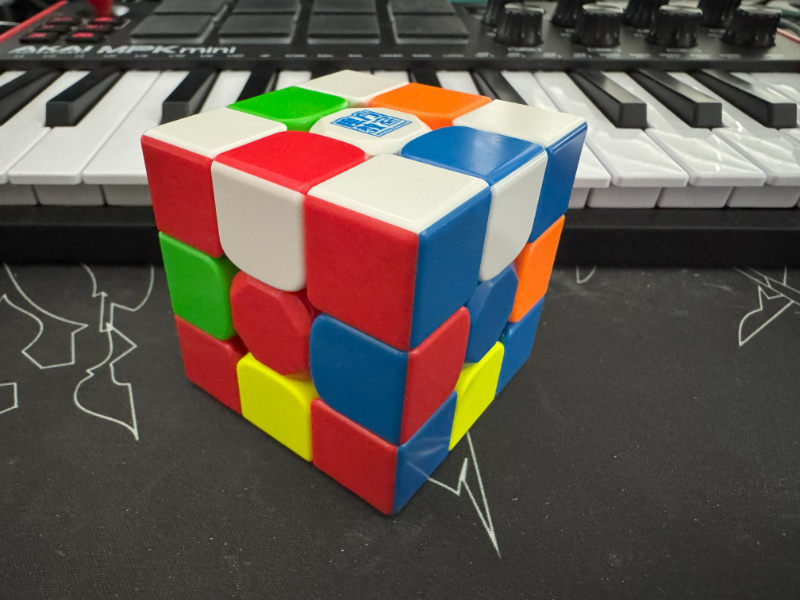The group theory game I've been looking for all along
It's the Rubik's Cube. I'm a speedcuber now.

So far, I've learned the beginner method and the first half of CFOP, which I'm practicing regularly. I started with a Rubik's brand sensory cube because it looked cute, but pretty quickly upgraded to a stickerless magnetic cube so that I could cut corners when turning. I have a sub-1:00 time under my belt and now I need to memorize, like, 16 algorithms (and the conditions to which they apply) to meaningfully lower that time.
I know, I know, posting about it is the doing it killer; if I crash out, that's fine. I'm just having fun using my hands to control something that isn't a mouse or keyboard.
Let me back up and explain the title of this post. I'm a fan of group theory, in the way that someone who watches YouTube videos about a topic is likely a fan of that topic. 3Blue1Brown's video about the Monster group was my gateway, and Another Roof's video about the Miracle Octad Generator has been on my Cool Stuff page since it was released. I find the sporadic simple groups in particular uniquely fascinating - bizarre edge cases embedded in the nature of symmetry itself. It feels like a glitch in the fabric of mathematics.
Another feeling I've learned I enjoy is when a game presents you with a twisted maze of possibilities that you must navigate in order to succeed. Czech Games is responsible for two of my favorite examples of this theme: Codenames and Letter Jam. In Codenames, each team must infer multiple words from a one-word clue, like decompressing a tiny ZIP file embedded in the semantics of the language. In Letter Jam, each player has to deduce a (different) missing letter from a given word, as though performing error correction on a noisy signal. I especially appreciate the clue giver's task in these two games, one where they must explore a large & complex problem space, while staying within the bounds of common sense - such that their collaborators can retrace their steps.
Language offers a particularly rich space to explore from these angles. Even games like Wordle and its imitators (and imitatees), though completely divorced from the meaning of the words, depend entirely on the nuances of the English lexicon to be so enjoyable. Imagine the joylessness of a Wordle clone called "99999dle" where the solution could be any 5-digit number; it's just not an interesting space to explore.
Group theory has a partial answer for why this hypothetical 99999dle game doesn't sound fun: the group you're exploring is too simple!¹ It's just the cyclic group C10 repeated 5 times, with no further adornments. Wordle operates in a similar product of C26, but the traversible area is, importantly, sparse. There are many more non-words than there are words of any given length. If Wordle's search space is a forest, 99999dle's is an empty warehouse.
Which, at last, brings us back to the humble Rubik's Cube. It's hard to describe it in terms of the prior analogy, because what makes a Rubik's Cube interesting to solve isn't its sparseness. While it's true that only 1 out of 12 possible configurations of a Rubik's Cube are solvable, that still leaves us with a fairly dense search space, well into the quintillions of possible states. It's the mere act of navigating those configurations that eludes intuition. From the cross (the "C" of CFOP) onwards, you will have to unsolve previously-solved portions of the cube in order to make progress. This quality isn't unique to the Rubik's Cube - many mechanical puzzles behave the same way - but the Rubik's Cube's deceptively simple appearance is hard to match. The search space itself is the maze!
I've wanted to marry these two ideas for months; the Levenshtein square was about as close as I got to inventing such a "group theory game" myself. Now that I've picked up speedcubing, I don't feel a pressing need to dig this game design rabbit hole any deeper. It's kind of silly, considering how canonical the Rubik's Cube is in this context. I mean, there's a picture of one right at the top of the group theory Wikipedia page!
¹ But, like, not a formal "simple group". It's actually quite composite, just in boring ways!
Anyway, if you thought I was going to go solve world peace in my jobless era, that's on you. I'm still just a gay cat who plays with toys. Having a little fun with it each and every day is what keeps me going. Now, if you'll excuse me, I have some algorithms to learn while I wait for my Python code to compile...